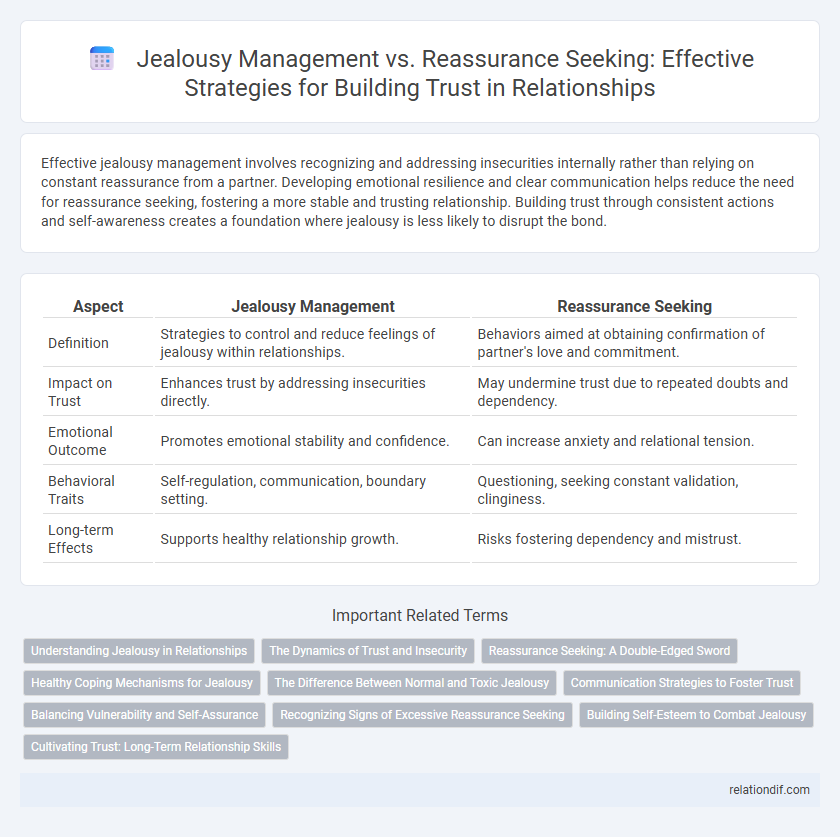Effective jealousy management involves recognizing and addressing insecurities internally rather than relying on constant reassurance from a partner. Developing emotional resilience and clear communication helps reduce the need for reassurance seeking, fostering a more stable and trusting relationship. Building trust through consistent actions and self-awareness creates a foundation where jealousy is less likely to disrupt the bond.
Table of Comparison
| Aspect | Jealousy Management | Reassurance Seeking |
|---|---|---|
| Definition | Strategies to control and reduce feelings of jealousy within relationships. | Behaviors aimed at obtaining confirmation of partner's love and commitment. |
| Impact on Trust | Enhances trust by addressing insecurities directly. | May undermine trust due to repeated doubts and dependency. |
| Emotional Outcome | Promotes emotional stability and confidence. | Can increase anxiety and relational tension. |
| Behavioral Traits | Self-regulation, communication, boundary setting. | Questioning, seeking constant validation, clinginess. |
| Long-term Effects | Supports healthy relationship growth. | Risks fostering dependency and mistrust. |
Understanding Jealousy in Relationships
Jealousy management in relationships involves recognizing and addressing emotional triggers to prevent destructive behavior, while reassurance seeking focuses on openly communicating insecurities to build mutual trust. Understanding jealousy as an emotional response rooted in fear of loss or inadequacy allows partners to develop healthier coping strategies that reinforce trust. Effective jealousy management reduces anxiety and strengthens connection, whereas excessive reassurance seeking may inadvertently undermine confidence and create dependency.
The Dynamics of Trust and Insecurity
Jealousy management involves controlling emotional responses to perceived threats, while reassurance seeking focuses on actively obtaining affirmations of trustworthiness from partners. The dynamics of trust and insecurity reveal that excessive reassurance seeking may undermine confidence, intensifying feelings of vulnerability and dependence. Effective jealousy management fosters internal security, promoting a stable foundation for trust without over-reliance on external validation.
Reassurance Seeking: A Double-Edged Sword
Reassurance seeking in trust dynamics often serves as a double-edged sword, providing temporary relief while potentially undermining confidence in relationships. Excessive reassurance can signal underlying insecurities, prompting partners to feel burdened and fostering a cycle of dependency that weakens trust. Effective jealousy management requires balancing reassurance seeking with self-assurance to maintain healthy and resilient interpersonal bonds.
Healthy Coping Mechanisms for Jealousy
Effective jealousy management involves recognizing triggers and practicing open communication to foster trust in relationships. Reassurance seeking can temporarily alleviate anxiety but may perpetuate insecurity if overused, undermining self-confidence. Healthy coping mechanisms prioritize self-awareness, emotional regulation, and boundary-setting to maintain trust and emotional stability.
The Difference Between Normal and Toxic Jealousy
Normal jealousy involves occasional feelings of insecurity that motivate open communication and trust-building, whereas toxic jealousy triggers controlling behaviors and constant suspicion, damaging relationships. Reassurance seeking in healthy jealousy helps partners feel valued and secure without undermining autonomy or trust. Toxic jealousy escalates to persistent demands for validation, reflecting deeper insecurities and eroding relational well-being.
Communication Strategies to Foster Trust
Effective communication strategies to manage jealousy and reduce reassurance seeking involve establishing clear boundaries and expressing emotions openly without judgment. Utilizing active listening and empathic responses helps partners feel heard and validated, fostering a secure environment that diminishes insecurity-driven behaviors. Consistent transparency and positive affirmation reinforce trust, minimizing the need for constant reassurance and building relational stability.
Balancing Vulnerability and Self-Assurance
Balancing vulnerability and self-assurance in trust dynamics involves managing jealousy without excessive reassurance seeking, which can undermine confidence and strain relationships. Effective jealousy management requires recognizing insecurities and fostering open communication that builds mutual trust, while maintaining personal boundaries to preserve self-worth. Cultivating self-assurance alongside vulnerability encourages emotional resilience, reducing dependency on constant validation and strengthening the foundation of trust.
Recognizing Signs of Excessive Reassurance Seeking
Recognizing signs of excessive reassurance seeking is crucial in managing jealousy, as it often indicates underlying insecurity and fear of abandonment. Frequent requests for validation, persistent doubts about a partner's feelings, and repeated questioning about the relationship's stability highlight an unhealthy need for constant emotional confirmation. Addressing these behaviors by fostering self-confidence and trust-building communication reduces anxiety and strengthens relational bonds.
Building Self-Esteem to Combat Jealousy
Building self-esteem is crucial for managing jealousy, as it empowers individuals to recognize their inherent value and reduces dependency on external validation. Developing a strong sense of self-worth mitigates the need for reassurance seeking, fostering trust within relationships. Strategies such as positive self-talk, setting personal goals, and practicing self-compassion directly combat insecurities that fuel jealousy.
Cultivating Trust: Long-Term Relationship Skills
Jealousy management involves recognizing and addressing feelings of insecurity without projecting doubts onto a partner, fostering emotional stability critical for cultivating trust. Reassurance seeking, while often perceived as a need for validation, should be balanced with self-confidence to avoid dependency and reinforce mutual respect. Developing long-term relationship skills requires transparent communication, consistent behavior, and emotional resilience to build and sustain trusting connections.
Jealousy management vs reassurance seeking Infographic

 relationdif.com
relationdif.com